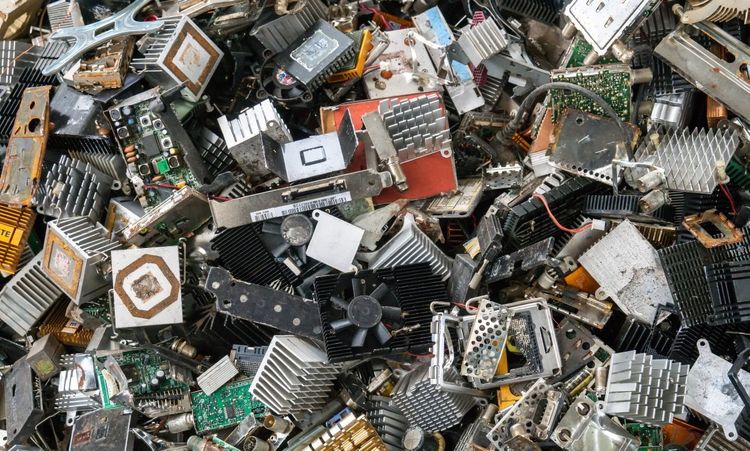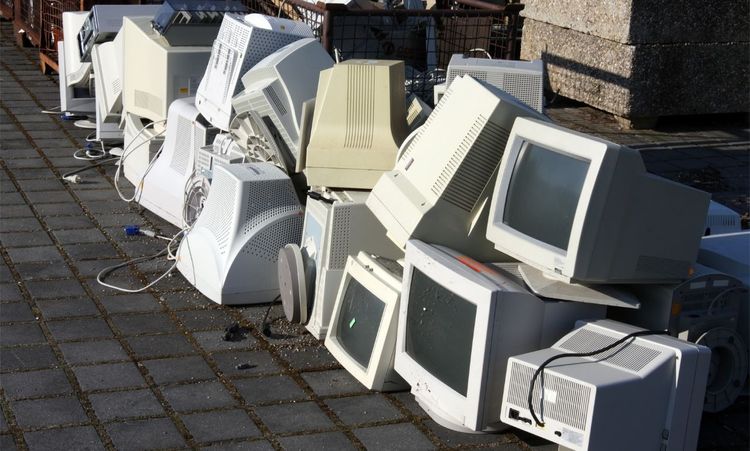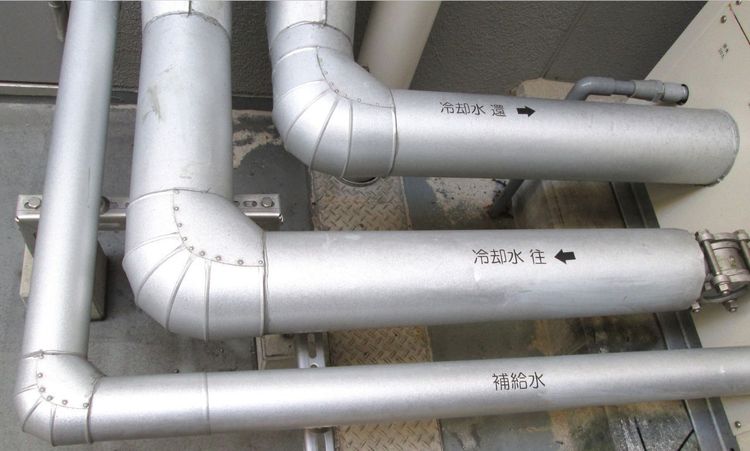Old computers lying around? Let's turn those dusty electronics into extra cash—fast. This guide shows you how to cash in on your computer scrap and help the planet.
Why Bother with Computer Scrap?
Environmental Impact
Improper disposal means toxic substances get into the soil. These poison water, damage ecosystems, and impact human health. Millions of tons of electronic devices are discarded annually, creating a massive environmental hazard. Electronic scrap ends up in landfills, releasing hazardous materials into the earth causing pollution that affects both wildlife and human beings.
When e-waste decomposes, it leaches harmful chemicals into the ground and groundwater, which can ultimately enter our food and water supplies. Hazardous materials in electronics, such as lead, cadmium, and brominated flame retardants, have been linked to serious health issues, including respiratory problems, developmental disorders in children, and even certain cancers.
E-waste recycling is an important measure to minimize the environmental footprint of discarded devices. By ensuring that electronic components are properly processed, harmful chemicals can be prevented from seeping into the environment.
Resource Conservation

Precious metals like gold, silver, and platinum don't grow on trees. They are mined at significant cost, both in terms of financial expenditure and environmental impact. Extracting them depletes natural resources. But your old, unused electronics hold these valuable metals.
Recycling electronic devices conserves valuable resources, turning them into raw materials for tomorrow's tech. Hard drives, motherboards, and circuit boards contain metals that can be recovered, refined, and reused to create new electronic equipment. Reusing valuable materials reduces the need to extract raw materials from the earth, which means less environmental damage.
Did you know that recycling one million cell phones can yield up to 35,000 pounds of copper, 772 pounds of silver, and 75 pounds of gold? This makes recycling e-waste a resource-efficient way to conserve precious materials and minimize environmental harm.
Economic Benefits
Recycling centers employ thousands of people—from skilled technicians who disassemble components to workers who handle the valuable metals extracted from e-waste. It's a booming industry that turns waste into cash and keeps millions of tons of e-waste out of landfills.
The electronics recycling business creates a sustainable supply of raw materials for manufacturers, which is especially crucial as the demand for electronics grows. By selling your e-waste for scrap, you contribute to a circular economy—an economic system aimed at minimizing waste and making the most of resources.
Plus, you can make some extra cash from your unused devices. The metals and components inside your electronics can fetch reasonable prices—think of it as cashing in on clutter. You sell, they melt—you pocket the cash, they create jobs.
The Good Stuff
Not every part of your old computer is valuable. But specific electronic components hold gold—literally and figuratively. Knowing what components are worth your time disassembling and selling is important.
Precious Parts That Pay
- Circuit Boards (Motherboards): Loaded with gold, silver, and palladium—they're e-waste royalty. They contain traces of precious metals that can fetch high prices at scrap yards and electronics recycling centers.
- Hard Drives: These have aluminum platters. Metal is beautiful, and scrap yards love it. Hard drives also contain rare earth magnets, which can be used for various purposes or sold for extra money.
- RAM Sticks: Those shiny gold fingers aren't just for show. Gold means cash. RAM sticks often contain traces of gold and other valuable metals, making them one of the most valuable components to scrap.
- CPUs (Processors) are small but rich in gold and valuable metals. They contain gold and platinum, which are worth a lot when recycled.
- Power Supplies: Copper-rich wires and components. That copper is money waiting to happen. Copper is a highly sought-after metal, and power supplies often contain bundles of copper wiring that can be sold for cash.
Focus on these—they're the jackpot. Separate these computer components, and you'll be looking for a sweet return.
Other Components Worth Considering
- Wiring & Cables: The copper wires inside the cables are worth salvaging. Broken cables may seem useless, but they're packed with valuable resources. Copper is often considered "red gold" in the scrap world due to its high value.
- CD/DVD Drives: They often have small quantities of precious metals. While not as lucrative as other parts, they still have a scrap value.
- Batteries: Lithium-ion batteries can also be recycled. Be careful, though, and make sure you handle them properly, as improper disposal can cause fires and environmental damage.
When scrapping a computer, it's best to disassemble as much as possible. The more valuable materials you separate, the higher your return.
Where to Exchange Computer Scrap for Cash
It's time to monetize that stash of scrap electronics. You have multiple options, from local scrap yards to specialized online sites. Let's break it down.
Local Scrap Yards
Scrap yards are convenient, and you get paid instantly. If you're lucky enough to have a scrap yard near you, it can be the quickest way to turn those old electronics into money.
- Pros: Nearby? Easy and instant payment. There is no need to deal with shipping or online sales.
- The cons are that it has a lower payout than other options, and while it's convenient, prices can vary. Scrap yards generally focus on metal weight, and prices fluctuate based on market conditions.
- Bonus Tip: Always call ahead to check the current market prices for electronic scrap. Know your worth.
Scrap yards are a good option for people who want immediate cash in exchange for their electronic scrap. However, the rates may be lower than what you could get elsewhere. If you have many components, it's worth shopping around.
Online Buyers
Online buyers like CJD E-Cycling or We Buy Dead Stocks often pay more than scrap yards. Specialized online companies are dedicated to buying electronic scrap and offer higher prices for valuable materials.
- Pros: Competitive prices, free shipping, convenience of online sales. These companies often provide labels and cover shipping costs, making sending your e-waste easy.
- The cons are that packing and shipping take time, and payment isn't instant; it takes days, not minutes.
- Pro Tip: Look for 'Certified Sites' or 'Buyback Companies' to ensure legitimacy and better returns. It's about more than just the money—a secure transaction.
Online buyers are popular for people looking to get the most value from their scrap electronics. These companies will take a wide variety of items—from desktop computers and mobile phones to video game consoles and toner cartridges—and offer fair prices based on the current market for precious metals.
Electronics Recyclers
Companies like Stream Recycling specialize in proper disposal while paying you in cash. Electronic recyclers focus on making sure that e-waste is processed in a responsible, environmentally-friendly way.
- Pros: It is environmentally sound, and the pickup service makes it convenient. They also ensure that toxic chemicals and hazardous materials are disposed of properly.
- Cons: Lower payout compared to scrap yards or buyback websites. They care about disposal—not profit.
Electronics recyclers are ideal for individuals who want to ensure their e-waste is handled responsibly. Although the payout might not be as high, the satisfaction of knowing you're making an environmentally conscious decision can be worth it.
Compare and Decide
Each option has its own perks and limitations. Pick what aligns with your goal—extra money fast? Local scrap yards. Top dollar? Online buyers. Feeling eco-friendly? Go with recyclers.
How to Prepare Your Computer Scrap Like a Pro

Preparation is key—maximize that scrap value. Let's make sure you're cashing in and not leaving money on the table.
Step-by-Step Prep
1. Disassemble the Computer
Be careful, and if you need help, look up a guide. We aim for the precious parts—motherboards, CPUs, RAM sticks. They're worth the real money. Disassembling might seem daunting, but it's simple once you get the hang of it. Use essential tools like screwdrivers and pliers to remove the various parts.
2. Sort Components by Value
Put all RAM in one pile, CPUs in another, etc. Scrap yards and buyers love it when it's pre-sorted—it means better cash for you. Pre-sorting your electronic components will save you and the buyer time, resulting in a higher payout.
3. Remove Personal Data
Hard drives? Clean them. Use disk-wiping software or, if in doubt, smash them. Seriously—don't sell a hard drive without protecting your privacy. You can use free tools like DBAN (Darik's Boot and Nuke) to erase data securely.
4. Proper Packaging
For shipping, use anti-static bags for motherboards, RAM, and CPUs. It's about protecting your items—broken pieces lose value. Packaging the components properly prevents transport damage, ensuring you get the best possible return.
Bonus Tips
- Handle Carefully: Damaged components lose value fast. Gentle disassembly saves the day. Avoid yanking components forcefully from the board.
- Weigh and Calculate: Before heading to the yard, know how much you have—it gives you bargaining power. Scrap yards base payment on weight, so knowing how much you bring gives you an edge during negotiations.
- Organize Your Scrap: Keep different types of scrap in separate containers. Organized components make things easier for you and show buyers that you're serious about scrapping—leading to higher cash offers.
How Much Cash Are We Talking About?
"How much can I get?"—the burning question. Here's the deal: the amount depends on market prices for metals, the weight of your electronic scrap, and who you sell to.
Average Earnings
- Circuit Boards: They are worth $5 to $10 per pound, depending on the gold content. High-grade circuit boards, like those in older computers, are worth more.
- CPUs: Higher-end CPUs can be worth $1 to $20 each. Due to their higher gold content, server-grade processors or older ceramic CPUs are more valuable.
- RAM Sticks: $5 to $30 per pound. Older RAM sticks with gold fingers tend to have more scrap value.
- Hard Drives & Power Supplies: Expect aluminum and copper rates—a few cents per pound, but better than nothing.
Damaged or Nonworking? No Problem
The components are still packed with valuable materials—the metals are worth the same, even if the device type is damaged. It's all about the raw material. Whether it's a broken CPU or a fried motherboard, the metals inside still retain value.
Markets and Demand
Earnings can fluctuate based on the demand for metals and electronic components. Some months, gold prices soar, while copper is in demand at other times. Monitor market trends to get the most bang for your buck.
Protect Yourself When Selling Online
Selling online can be lucrative—but it's also riskier. Protect your privacy and personal information.
Safety Tips
- Choose Trusted Buyers: Find verified online companies with certified electronics recycling services. Always do your research before sending components to anyone.
- Erase Personal Data: Never sell storage devices without wiping data first. Use trusted data destruction software to ensure your privacy remains intact.
- Check Reviews: Reputation matters. Stick to popular options with secure websites and certified credentials. Look for certifications from organizations like e-Stewards or R2, which ensure environmentally friendly and responsible recycling.
It's easy cash—but do it right.
Where Does Your Computer Scrap Go After Sale?
What happens once you sell that pile of scrap electronics? Here's the process:
- Collection and Transportation: The buyer collects the e-waste—your sold goods—and transports it to a certified electronics recycling facility. Specialized equipment handles different types of waste and separates out the valuable components.
- Material Separation: Metals, plastic, and hazardous materials—each gets separated.
- Precious Metals (Gold, Silver, Palladium) are extracted and melted down. They are then refined and used to manufacture new electronics.
- Plastics and Other Reusable Materials: Non-metal parts are shredded and reprocessed into usable plastic material.
- Harmful Chemicals: Proper disposal to prevent environmental contamination. Hazardous materials, like lead and mercury, are handled separately to prevent pollution.
- Refining & Reuse: Metals are repurposed for new tech—phones, laptops, even gaming consoles. Recycling is crucial for ensuring that valuable resources are reused rather than wasted.
Recycling e-waste involves a wide range of processes designed to reduce improper disposal and effectively use every ounce of metal. Precious metals are separated, refined, and prepared for reuse through advanced processes like electrolysis and smelting.
Popular Trade-In and Buyback Programs

Not all scrap needs to go to the yard. Retail stores and big brands have trade-in programs that might just offer better value—maybe even promotional credit.
- Amazon: Turn electronics into Amazon e-gift card account credit. Instant store credit is available for those who prefer credit in return. Amazon-certified recyclers ensure the responsible recycling of old devices.
- Apple &and Best Buy offer similardeals—: xtra cash or in-store credit in exchange for your old devices. Apple accepts many products, including mobile phones, desktops, and other electronic devices.
- Gaming Console Buyback: Still have that Xbox or PlayStation? Trade it for bonus cash or gift cards for recycling electronics. Certain gaming stores have buyback programs for video game consoles that are in good condition.
This is especially useful if your devices aren't entirely nonworking or if you prefer gift cards over cold hard cash. Trade-in credit or promotional credit can offer better value than selling for scrap, especially for devices still in decent condition.
Conclusion
Got old computers? Stop letting them gather dust. Transform unwanted gadgets into extra cash—because that outdated desktop isn't trash; it's a treasure.
Recycling electronic scrap has significant environmental benefits and puts money back in your pocket. There are always opportunities to recycle and gain money, whether it's old desktop computers, unused gadgets, or broken devices.
Recycle your scrap electronics. Pocket some extra cash. Save the planet.
Start by locating your local scrap yard or certified electronics recycler. Shop online for competitive prices and use an advanced search option if needed.
Declutter your space. Make money. Conserve resources.
Turning waste into cash isn't just clever—it's the right thing. Let's save the earth one piece of equipment at a time.
Also Read: Best Cosmetic Case for Barbers




